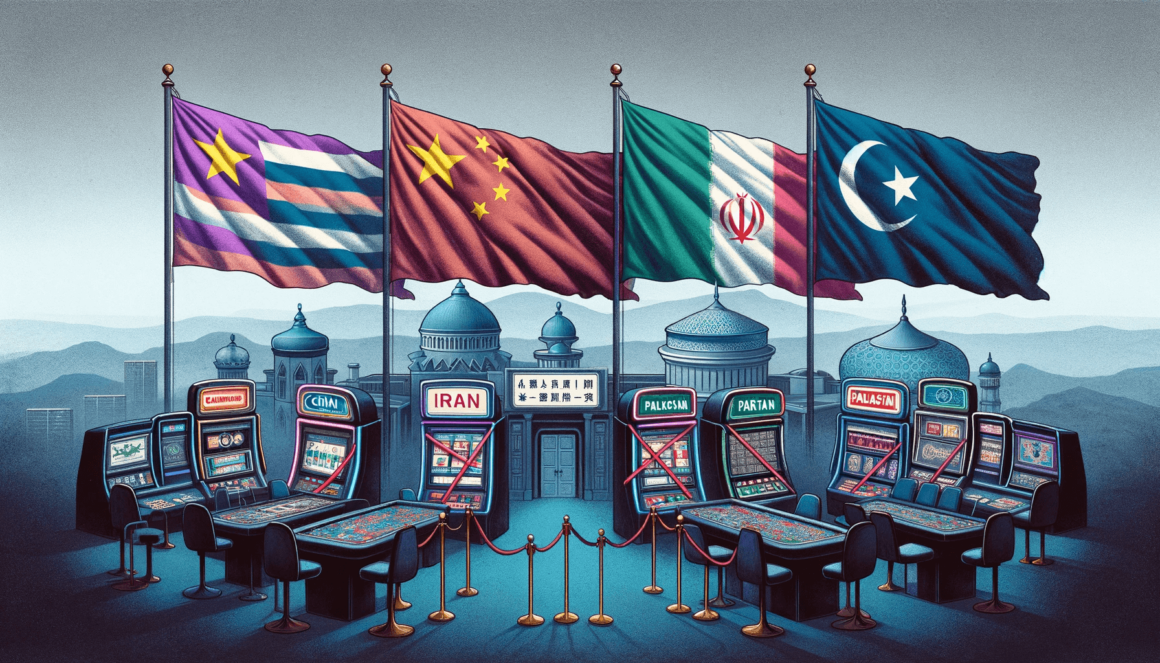An In-Depth Guide On Countries Where Gambling Is Illegal
Gambling is an exciting way to spend time with family and friends. Wagering is also a means to escape life’s realities and stress. Meanwhile, some countries have gambling as part of their traditions.
However, gambling can get out of control. What used to be a social activity becomes an addiction, bringing new and harmful habits. Some countries cannot stand around and watch that happen. That is why numerous territories worldwide ban wagering activities.
Continue reading to learn about countries where gambling is illegal and why they made it so.
Highlights of the Article
- The main factors that affect a country’s gambling law are social, cultural, religious, and political views.
- Kosovo is one of the only few countries in Europe where gambling is illegal, done in hopes of avoiding gambling-related crimes.
- Although gambling is a big part of Chinese culture, betting activities, except the lottery, are banned in the country.
- As Buddhism is Thailand’s main religion, gambling is illegal because it does not direct a person to a noble path.
- Most Muslim countries follow an Islamic theocracy, prohibiting gambling based on the teachings of the Quran.
- Cuba is no longer equal to Las Vegas in terms of the gambling industry since the Cuban Revolution of 1959, which saw the implementation of anti-gambling laws.
- Gambling is illegal in Utah because more than half (55%) of its population practices Mormonism, which opposes gambling.
- Some countries illegalize gambling due to its negative effects like addiction, corruption, accumulating debt, and increased alcohol and substance abuse.
List of Countries Where Gambling is Illegal

Every country has different gambling restrictions. Some government bodies monopolize the industry in their territories. Others ban all types of gambling, leaving citizens with no way to play legally.
The rationale for banning gambling varies per country, such as:
- Social reasons: There will come a point when gambling gets out of hand. Once a person becomes addicted to it, they are prone to gambling harms like:
- Racking up debts
- Reduced budget on essentials like food
- Decreased productivity for work or school
- Selling belongings to fund their betting habits
Gambling addicts are also at risk of developing alcohol and substance dependence. That ultimately contributes to a higher incidence of criminal activities, risking citizens’ lives.
To protect the residents from these damages, authorities make gambling illegal.
- Cultural and religious reasons: Most anti-gambling laws are driven by morality and religion. Those societal institutions and norms consider gambling a sin.
- Religious scriptures like the Bible and Quran oppose gambling because it is unnecessary and causes harm to society.
- Gambling is “bad” because it takes and does not give. Plus, it makes people rely on false hopes instead of working hard to contribute meaningfully to their community.
- Wagering promotes the love of money, which fuels greed and envy.
- When a country is highly religious and conservative, doing activities that oppose beliefs is shameful. To avoid any temptations, authorities ban gambling.
- Political reasons: When countries expand gambling activities and establish more facilities, they raise additional and significant revenue. However, there is a risk that the spike in revenue is only short-lived.
Revenue will slow down, reverse, or drop in the long run. That is harmful to the country that invested so much in the industry.
Moreover, a larger gambling industry needs more attention. Some countries where gambling is legal cannot trace all the money dealings. Therefore, they also lose money even though they regulate the industry.
See the list of countries where gambling is illegal below. You will also learn their reasons for doing so and the offenders’ punishments.
Oceania
Several countries and independent territories lie in the South Pacific Ocean region called Oceania. Australia, New Zealand, and Papua New Guinea dominate it.
These territories have varying laws in gambling. According to recent reports, there are over 7 million gamblers in Oceania. However, 2 domains do not contribute to that value since they banned gambling. Learn more about them below.
Marshall Islands: Gaming and Recreation Prohibition Act of 1998
This region consists of 1,200 islands scattered over 180,000 square miles.
Its gambling legislation states that gaming and gambling activities are prohibited in the Marshall Islands.
The law exempts non-profit organizations from organizing the following gambling activities:
- Bingo
- Raffles
- Cakewalks
These activities must solely be for fundraising. Any person or corporation involved in recreational wagering will be fined $1,000 or 1 year of imprisonment.
Tokelau: Native Ordinance of 1917
Meet Oceania’s smallest country and the 4th smallest worldwide. Tokelau’s gambling law is from the Native Ordinance of 1917. It is a basic constitutional structure that covers simple rules, including prohibiting gambling.
Any activities of wagering are punishable by fine or imprisonment with hard labor.
Europe
This continent generates the most revenue from gambling. In 2020, the European gambling market was worth €81.1 billion. Statista predicts its market will spike to at least €122 billion in 2025.
The UK generates the highest gambling revenue among all European nations. Meanwhile, some territories in Europe have varying attitudes and laws regarding gambling.
Kosovo: Law on Games of Chance
From 2009 to 2019, gambling in Kosovo grew rapidly. The government earned €20 million per year from gambling taxes. There were 4,000 workers in the industry. However, they were left jobless in 2019.
At that time, Ramush Haradinaj, Kosovo’s prime minister, banned all kinds of gambling for a decade. A week before that decision, two casino employees were killed due to conflict.
Haradinak stated he would not allow gambling venues to be arenas of crime and claim people’s lives. Since then, only the state-wide lottery has been allowed to operate in Kosovo.
Asia
Gambling is embedded in Asian cultures. Most Asians first learn to gamble in their homes. Even kids learn to gamble by playing with their older relatives and companions.
Asia’s gambling market size was worth $19.5 billion in 2022. It is expected to grow at 11.39% from 2023 to 2028, putting the market’s worth at $37.5 billion in 2028.
However, the following Asian countries won’t contribute to that growth as they banned gambling in their territories. Read on to learn more about them.
Jordan: Penal Code Article 393 and 394
As a Muslim country, Jordan completely bans all gambling activities. The country never issued any licenses or allowed any gambling operators. Some countries exempt the national lottery from gaining extra funds, but not Jordan.
The ban extends to online gambling. However, Jordanians still participate in wagering online through offshore casinos. The average revenue per user in Jordan’s online games market is $5.76 in 2023.
So far, Jordan authorities have not punished any residents participating in online gambling.
Afghanistan: Forbidden under Islamic (Sharia) Law
The country does not have any official gambling laws. As most of the country’s population is Muslim, it automatically follows the teachings of the Quran or Islamic law.
A Quran verse describes gambling as an abomination, which is the reference for prohibiting all gambling activities in the country. With that, there are no means of gambling in Afghanistan.
However, Afghanistan citizens still gamble secretly online. Only 18% of the country’s population has internet access, making it hard for its online gambling industry to thrive.
Bahrain: Bahrain Penal Code
Islam is Bahrain’s official religion, which pushed the legislation of the country’s anti-gambling law. It’s called the Bahrain Penal Code, which completely bans all gambling activities in the country.
Bettors will be fined 300 Dinar and face up to 3 months of imprisonment for their initial offense. Repeat offenders will face increased fines and times of up to 500 Dinar and 1 year of imprisonment.
The penalties for gambling operators in Bahrain are 1,000 dinars and 1 year in prison.
Bahrain’s gambling laws have no mention of prohibiting online betting. Regardless, telecommunication regulators in the country are ordered to block gambling websites.
Brunei Darussalam: Common Gaming Houses Acts
The Islam religion is dominant in Brunei Darussalam. According to its religious teachings, gambling is extremely discouraged. That sparked the creation of the Common Gaming Houses Acts, which prohibits gambling.
There are no exemptions in Brunei’s anti-gambling laws. Even tourists must adhere to the rules. All violators, even those who “unknowingly” disobeyed the laws, may be arrested, imprisoned, or expelled.
China: The Criminal Code of Republican China
Gambling is a big part of China’s culture. A Chinese proverb says, “If you don’t gamble, you won’t know how lucky you are.” They also believe that winning is a blessing by supernatural forces, which reflects a person’s good luck.
During Chinese New Year, gambling, mostly playing Mahjong, is common. Participating in it will help bring luck and prosperity throughout the year. However, despite the importance of it in their culture, gambling has been illegal in China since 1949.
Citizens can only participate in government-approved lotteries. Meanwhile, all land-based and online gambling is prohibited.
However, Chinese residents and operators still find a way to practice gambling. Gaming organizations like the Guangdong Club can still operate in China but are registered in Costa Rica.
China’s gambling ban is a blessing to the rest of Asia. Most of the casinos in South-East Asia specifically lure Chinese gamblers to play in their venues.
In the Philippines, 34 Philippine Offshore Gaming Operators (POGO) give Chinese gamblers access to online gambling hubs. That provided the Philippine Bureau of Internal Revenue with $12.6 billion worth of withholding taxes from POGOs.
Iran: The Civil Code of the Islamic Republic of Iran, Section 12 Article 654
The Republic of Iran is an autocratic Islamic theocracy. That means all rules of the Shia Islam religion determine the country’s rules as divine guidance.
Gambling is one of the major sins in the Shia Islamic religion. Naturally, that makes any gambling activities prohibited in Iran. Gambling and betting are explicitly stated as void and illegal in Section 12 Article 654 of the Civil Code of the Islamic Republic of Iran.
Although there are no mentions of online gambling, the law is assumed to cover that sector. Anyone caught gambling will receive flogging or 6 months of imprisonment. As for those who gamble in public, they will receive both punishments.
Indonesia: Article 303 of Indonesia’s Criminal Code
The world’s largest Islamic population is found in Indonesia, but it is not a Muslim nation according to its constitution. Nevertheless, most Indonesians follow the Quran’s teachings that gambling is sinful.
This solid inclination for Islamic laws was demonstrated in 1993 when the Indonesian government briefly legalized the lottery. Several Muslim-led protests occurred nationwide, objecting to the legislation as it violates Islamic law. Not a week after, it was discontinued.
To this day, Indonesia has no casinos or licensed gambling operators, both physical and online.
Malaysia: Betting Act of 1953 (Revised 1992)
Religion is the determining factor of Malay and Non-Malay in the country. Regarding gambling in Malaysia, the resident has to adhere to the laws that answer to their religion.
Several forms of gambling are regulated in Malaysia, such as:
- Lotteries
- Horse racing
However, they are only available to Non-Malays who are not bound by the Sharia law. As for Muslim individuals, the government enforced a separate Islamic law that prohibits them from all forms of gambling.
Maldives: Maldivian Criminal and Penal Law
Maldives is one of the countries with a 100% Muslim population. Any non-Muslim individual cannot become a citizen of Maldives. Therefore, as a Muslim country, Maldives refers to the Islam religion as the basis of all laws.
Since the Quran forbids all forms of gambling, any activities related to it are prohibited in the country.
Pakistan: Gambling Prevention Act of Pakistan of 1977
This is another Muslim country that strictly adheres to the teachings of the Quran. Therefore, its laws forbid all forms of gambling. Because of that, Pakistan never had any land-based casinos or gambling venues.
The Gambling Prevention Act of Pakistan was passed in 1977. The government generalizes the law. It says all kinds of gambling are prohibited, including online gambling, even though it is not explicitly addressed.
Qatar: Law No. 11 of 2004, Articles 274-275
The official state religion of Qatar is Wahhabi Sunni Islam. Its instructions forbid all kinds of gambling, which influenced the ratification of the country’s anti-gambling laws.
Qatar’s Law No. 11 of 2004 contains regulations about gambling. Under articles 274 and 275, any form of gambling is punishable by 3 months of imprisonment and a 3,000 Qatari Riyals fine.
If the offender gambled in public, imprisonment is extended to 6 months. They will also be fined 6,000 Qatari Riyals.
Saudi Arabia: Forbidden under Islamic (Sharia) Law
Gambling is referred to as “maisir” in the Quran, which translates to “abhorrence” or “the work of Satan.” As a strict Islamic country following the teachings of the Quran, there are no legal gambling opportunities in Saudi Arabia.
The country had never seen a Poker casino, a licensed bookmaker, or an online casino operator. Moreover, tourists are not exempted by the law. They must avoid bringing “instruments of gambling” and participating in online wagering.
Syria: Forbidden under Islamic (Sharia) Law
From the 1960s to 1970s, gambling was legal in Syria. However, in the 1970s, the only 3 casinos in the country closed down due to religious conservatives.
In 2011, a new casino emerged in Damascus named the Ocean Club. It received mixed reactions from Syrians. Some gamblers are all for it since they would not have to travel to Lebanon to play casino games.
On the other hand, Syria’s Muslim population is against the casino. They fear that participating in it will lead to the collapse of society because the Quran forbids it. Regardless, the Ocean Club remains standing in Damascus.
Thailand: Gambling Act of 1935
Only 2 forms of gambling are available in Thailand, which are:
- State-run lottery
- Horse race betting
The government legalized the lottery by making it a state enterprise. It is one of Thailand’s sources of state revenue. Meanwhile, residents see horse racing as a civilized activity, and so is betting about it.
Other gambling activities are prohibited in the country, following Buddhist values deeply in Thai society. According to Buddha’s teachings, gambling would not bring a person toward the Arya or the noble path.
UAE: UAE Penal Code
The government of the United Arab Emirates falls under Islamic laws, which consider gambling as a sinful act. With that, all forms of wagering are forbidden in the UAE.
Anyone caught in a betting game shall face not more than 2 years in jail and pay a fine of almost 50,000 AED. Meanwhile, illegal gambling operators can be sentenced to up to 10 years and fined almost 100,000 AED.
However, the government introduced reforms to the Penal Code in 2020. It bids to modernize the Persian Gulf of Arab States. Doing so allows a more liberal approach to social freedoms, bringing more revenue to the territory.
In early 2023, UAE’s first casino project, the Wynn Al Marjan Island, started construction in Ras Al Khaimah. Building it costs $3.9 billion and will take 4 years to complete. It is a luxury resort that will feature the following:
- Gaming area
- A high-end shopping boardwalk
- 24 dining and lounge experiences
- Over 1,500 rooms, suites, and villas
Africa
The gambling industry in Africa has been seeing a massive shift. It’s gaining popularity amongst the younger generations. In Kenya alone, 83.9% of the youth admitted to partaking in wagering activities.
Online gambling in Africa also increases due to digital advancements and high Internet penetration. By the end of 2023, Africa’s online gambling market will reach $1.62 billion in revenue.
However, not all of Africa contributes to the gambling industry. There are territories in the continent that prohibit betting activities. Find out more information about them below.
Algeria: Forbidden under Islamic (Sharia) Law
The Algerian constitution declares Islam as the state religion, prohibiting residents from showing behaviors incompatible with Islamic teachings. This is why gambling is outlawed in the country.
However, although most laws are based on the Quran, Algeria still respects its residents’ rights to practice a religion of their choice. Ultimately, all must respect regulations, no matter what inspired their legislation.
Eritrea: Forbidden under Islamic (Sharia) Law
The country consists of 2 major religions, namely Christianity and Islam. Both religions discourage gambling. The only difference between them is their specific views on wagering activities.
In Christianity, gambling is not exactly evil. Still, the Bible opposes all kinds of bettings because it motivates a wrong desire. Meanwhile, the Quran sees gambling as sinful and forbidden or haram.
Eritrea sticks to Islamic law, automatically making gambling illegal in the country. That includes online betting, even though it is not explicitly stated. Still, Eritrea residents place their wagers online through foreign websites that welcome their bets.
Ethiopia: Legal under Proclamation number 183
Several forms of gambling are legal in the country. Ethiopia’s National Lottery Administration regulates the following gambling activities:
- Sports betting
- Casino games
- Lottery (only form that is not regulated online)
Gamblers must be 21 years old to gamble legally in Ethiopia. However, sports betting is popular among university students in the country. That sparks concerns among residents.
The Ministry of Women and Social Affairs in Ethiopia supports the ban on sports betting once and for all. Doing so will protect the nation’s youth. A ban will also help avoid an economic and social crisis.
Libya: Penal Code of 1953
Since Libya is dominantly a Muslim country, it follows the Quran’s views regarding gambling. The scripture describes gambling as abhorrent. That said, betting activities are prohibited per the 1953 Penal Code of Libya.
Mauritania: 1983 Penal Code of Mauritania
Like most African-Muslim countries, Mauritania implements anti-gambling laws to follow the teachings of the Quran. That is why there are no casinos in the country.
Mauritania’s ordinance does not mention the ban on online gambling. Regardless, the country generalizes the law to prohibit it.
Somalia: Somalian Penal Code
Over 99% of Somalia’s population is Muslim, making the country adhere to Islamic laws. The Quran opposes gambling. Therefore, gambling is illegal in Somalia.
Anyone caught in any betting activities shall be punished under Shari’a law. Offenders won’t be fined or imprisoned. Instead, they will receive public flogging.
Sudan: 1991 Criminal Law Act
The country’s official state religion is Islam. The Quran strongly influences Sudan’s politics and laws, making gambling illegal.
The Penal Code of Sudan under Chapter 19 Section 237 briefly describes its anti-gambling law. Any game of chance or drawing any lottery is an offense. Anyone caught violating the law will be imprisoned for almost 6 months, fined, or both.
North America
This continent includes the USA, Canada, and Mexico. All of them are top contributors to North America’s thriving gambling industry, especially the United States, which is home to the Las Vegas Strip and Atlantic City.
Las Vegas saw a 20.5% increase in visitors in 2022, totaling 38.8 million. That same year, the Las Vegas Strip took in $8.2 billion in revenue, a 17.1% spike from 2021’s $7 billion.
However widespread and accepted gambling activities are in North America, a few countries and states prohibit them.
British Virgin Islands: Legal under the Gambling (Gaming & Betting) Control Act of 2020
The British Virgin Islands legalized and regulated gambling in 2020 under the Gambling (Gaming & Betting) Control Act. The law states that the country’s legal gambling age is 18.
There are no explicit punishments for minors caught gambling. Instead, the adult who invites them to gamble or employs them in a betting venue will be liable. They will face almost a $10,000 fine, up to 2 years of imprisonment, or both.
Cuba: Ley (translates to Law) 86 1959
The gambling industry of Cuba used to be as lavish as Las Vegas. If not in Nevada, Americans will gamble in Cuba.
However, the country’s betting scene was a center for mob investments, especially in Havana. The Cuban Revolution of 1959 overthrew the dictator, Fulgencio Batista, and ended that.
The revolution’s leader, Fidel Castro, installed a government and ruled Cuba from 1959 to 2008. One of the first things he did was shutting down casinos and nightclubs in Havana. He also passed a law that bans gambling in the country, which remains in effect until today.
USA (Utah): Utah Code Section 76-10-1102
Utah is one of the only two states in America where gambling is illegal. 55% of Utah’s population practice Mormonism, a religion hostile towards gambling. Mormons oppose the legislation and regulation of gambling in the state.
In Utah, any betting activities are considered a Class B misdemeanor. That means offenders will be charged a $1,000 fine and face 6 months of imprisonment.
Providing gambling services is subject to more punishment. It is a Class A misdemeanor in Utah, an offense punishable by 1 year of imprisonment and up to a $2,500 fine.
Did You Know?
In the US, each state determines whether to legalize or ban gambling and sports betting. This setup has led to differing levels of success regarding the revenue generated by the gambling industry in the country.
For example, Connecticut’s online gambling market is among the highest income-producing states in the US. The growth originated from CT’s loose and conducive gambling regulations.
USA (Hawaii): Hawaii State Legislature Section 712-1223
Hawaiians are famous gamblers. However, it is illegal for them to place any bets in recreational venues or public. Residents can only gamble socially.
For Hawaiians, social gambling is not enough. Reports show that Hawaiians take 300,000 trips to Las Vegas and other US states to wager legally.
Despite its prohibition, gambling brings economic burdens to Hawaii. The NCPG revealed soe 20,000 problem gamblers in Hawaii drive the social costs of gambling addiction to $26.3 million.
The government had to avoid such a thing from troubling their gambling-free country. With that, Hawaii no longer allows advertisements of any hotels, resorts, and other recreational services in Nevada.
South America
Most countries in South America regulate gambling. However, their laws vary from one another. Regardless, casino games in South America alone will earn $72.49 billion in revenue by the end of 2023.
However, that is only half of South America’s gambling industry potential. Half of the continent’s population are Brazilian residents, and they cannot gamble legally. Let’s discuss that further below.
Brazil: Criminal Misdemeanour Law
This nation is Latin America’s largest and most populous territory. However, it does not contribute to South America’s gambling industry due to its anti-gambling laws. In terms of the betting industry, Brazil is a sleeping giant.
Gambling has been illegal in Brazil for 70 years. The law does not explicitly ban “gambling.” Instead, it mentions the prohibition of “games of chance.” Therefore, games of skill like poker are technically not illegal.
However, the only accepted forms of gambling in Brazil remain few, which are:
- State-run lottery
- Horse race betting
Negative Effects of Gambling

A country gains many economic benefits from gambling. One notable benefit is providing job opportunities for locals. The University of Chicago revealed that unemployment rates are 12% to 17% lower in communities close to casinos.
However, in exchange for those benefits are the negative effects of gambling. For some countries, the harmful costs of betting we discuss below do not make the gains worth it.
Addiction
Becoming addicted to gambling is similar to drug and alcohol addiction. Betting activities turn on the brain’s reward systems through a dopamine surge. This causes sensations of pleasure, which a person tries to replicate by playing more.
Addiction leads to problem gambling. In the US, it severely affects 2 million adults. It led to the national social cost of gambling coming to $7 billion, including the following:
- Job loss
- Bankruptcy
- Healthcare spending
- Gambling-related crimes
Most of all, problem gambling causes the following harm to an individual:
- Reduced savings
- Self-esteem issues
- Developing a short temper
- Reduced work or study performance
- Having less time for friends and family
- Feelings of regret, guilt, shame, and hopelessness
Betting’s adverse effects do not spare the friends and family of a problem gambler. Second-harm gambling problem exists and causes the following:
- Financial difficulties
- Impaired family relationships
- Increased susceptibility to family violence
- Feelings of resentment, rage, and confusion
Corruption in Sports
Sports betting is a large industry whose market value was $83.65 billion in 2022. It is a popular way to show loyalty to an athlete or team. Moreover, it is a quick and fun activity to win money.
However, gambling sparks corruption in sports. The most common forms of sports betting crimes are bribery and match-fixing. Though often intertwined with one another, there are differences.
- Bribery: This is the act of offering money or anything of value in exchange for a guarantee that something will happen accordingly.
In sports bribery, people attempt to influence the sporting event’s course by bribing:
- Coaches
- Referees
- Team managers
- Sports executives
A famous example is the 2015 FIFA corruption scandal. Accusations point out that bribery was involved in the awarding of hosting rights to:
- Russia for the 2018 World Cup
- Qatar for the 2022 World Cup
This issue made FIFA executives reveal they received $150 million in bribes in over 2 decades.
- Match-fixing: Match-fixing is when a sporting event has a pre-determined result based on manipulating an external body. This only happens if the sports team or management complies with a bribe.
A fixed match ensures that somebody’s bet wins and their earnings will be significant.
Debt
Small bets will result in only small wins. Meanwhile, a large gambling budget ensures significant winnings. That’s why you must have enough money to continue gambling.
When gambling gets out of hand, a person finds it hard to stop betting. Regardless if they still have the funds to support their gambling. That results in accumulating a gambling debt from the following:
- Bookies
- Loan sharks
- Credit cards (for online gamblers)
- Borrowing from a friend or family
Money is a sensitive subject for many people. Lenders will always be after the debtor. Since gambling does not always guarantee a win, the borrower risks losing money.
Lenders might threaten the debtor to pay them right on time. Otherwise, they can get hurt, or their family will be in danger.
This puts pressure on the gambler. The thought of being unable to pay debts can lead to suicide, contributing to the yearly 5% of suicides due to gambling.
Alcohol and Substance Abuse
Some people enjoy gambling as it is. However, other gamblers lose control of their betting habits, affecting their alcohol and substance consumption.
People get addicted to gambling due to the “pleasure” or “feelings of euphoria” they get from winning. Liquor and drugs trigger the same effects. They become the perfect gambling partner, ensuring a constant high. It would be harder for the person to quit. This also creates more problems in the gambler’s family. Ultimately, it can lead to more gambling-related crimes, making alcohol and substance abuse some of the most detrimental effects of gambling.
Infamous Individuals/Groups That Got Jailed For Gambling
The gambling industry sees many con artists every day; locals, casino workers, famous gamblers, celebrities, and kingpins. Even though some of them tend to get away from the law, one way or another, they will get caught.
Here are some people that were no exemptions to gambling laws worldwide:
Tim Donaghy
He was a former professional basketball referee in the NBA and officiated almost 800 games for at least 14 seasons. However, Tim Donaghy’s 13-year career ended in July 2007.
The court did not prove that Donaghy specifically tailored calls to his favor during games he officiated. However, he was caught betting on the games he officiated, rousing suspicions of match-fixing.
His accomplices are two of his longtime colleagues. They wagered on the games Donaghy officiated. For that, Donaghy did 11 months in prison in Florida.
Pete Rose
A strict rule in Major League Baseball prohibits anyone from betting on a game they are involved in. Peter Rose, player-manager of the Cincinnati Red, denied the allegations that he did such a thing for 15 years.
Rose then revealed in 2004 that the allegations were true about him by talking about it in his autobiography. In his defense, he bet on his team because he loves and believes in them.
Regardless of that sentiment, Rose did 5 months in jail in Marion, Illinois. He also paid a fine of $50,000. When he was released in 1991, Rose paid another $300,000 in back taxes and interest on atop 1,000 hours of community service.
Most of all, he was also banned permanently from betting on baseball.
Dan Tan
He is also referred to as the match-fixing kingpin who arranged over 150 sporting events in the following countries:
- Italy
- Finland
- Nigeria
- Hungary
Several European governments investigated Dan Tan for 4 years until a series of raids in 2013 led to Dan Tan’s arrest in Singapore. Betting tips from his business partner, Wilson Raj Perumal, helped arrange Tan’s apprehension.
After 2 years in jail, Tan was released from prison through an appeal. Just 6 days later, he was re-arrested for alleged criminal activities. He was released in December 2019 under conditions of electric tagging, curfews, and weekly reports to the police.
Final Thoughts
The gambling industry is thriving worldwide, seeing dollars in revenue per year. No matter how beneficial that may sound, not all countries are inclined to follow the money found in gambling.
However, laws are still subject to change. A country with anti-gambling laws can one day finally see it fit to legalize betting. On the other hand, territories that currently allow gambling can decide to outlaw it for the same reasons.
Ultimately, authorities implement laws based on the country’s current social, cultural, religious, and political views. All might shift in the future, bringing along the fate of the country’s gambling industry.
FAQ
Which country has the worst gambling problem?
Australia is the world’s biggest gambling loser, with an average loss of $1,277 per gambler. People experiencing gambling-related problems in the country are close to 8% of its population.
Is gambling still illegal in the US?
Gambling is legal in the US except for Utah and Hawaii.
What country has the strictest gambling laws?
Qatar has one of the most strict gambling laws, which adhere to the teachings of the Quran. All forms of gambling, offline or online, are forbidden in the country.
 BC.Game
BC.Game  7Bit
7Bit  Ducky Luck
Ducky Luck  Red Dog
Red Dog